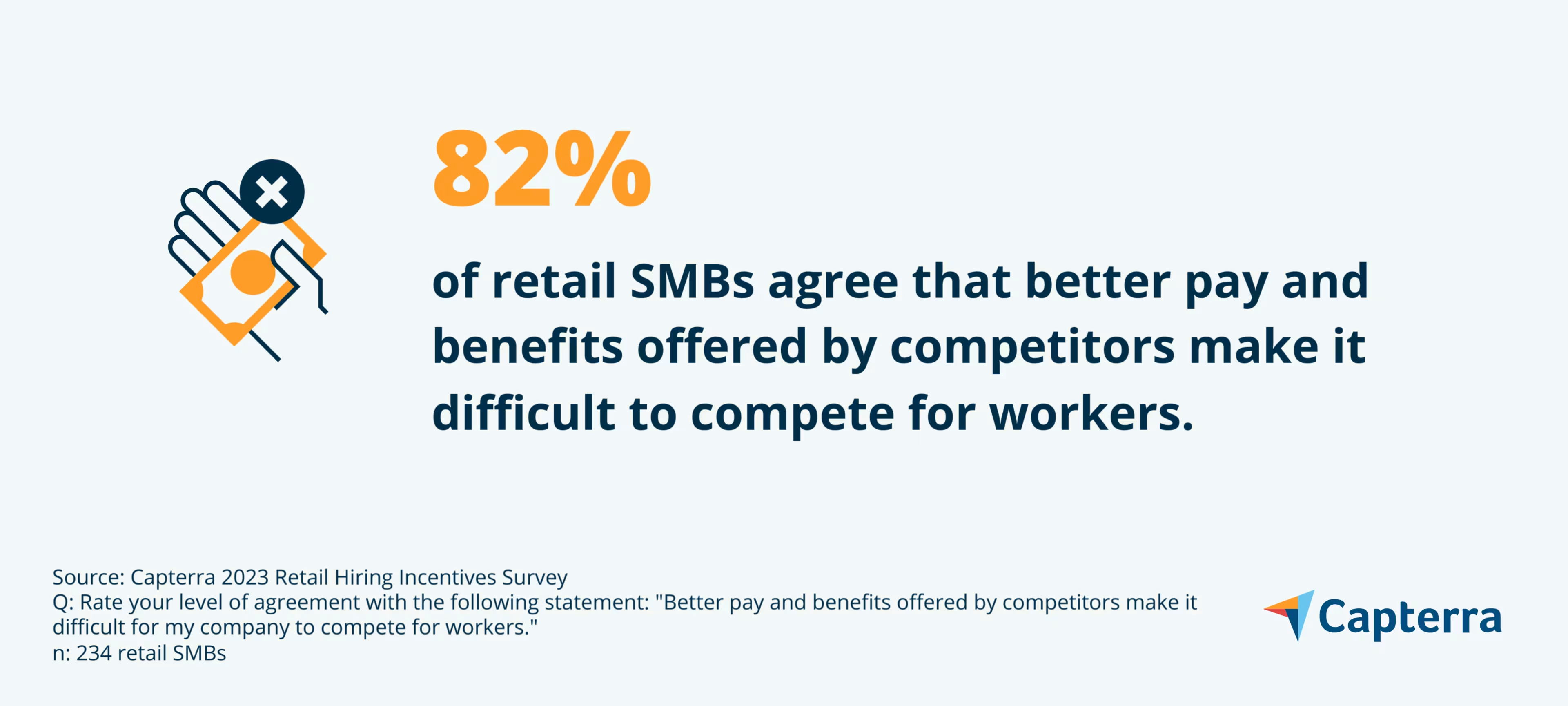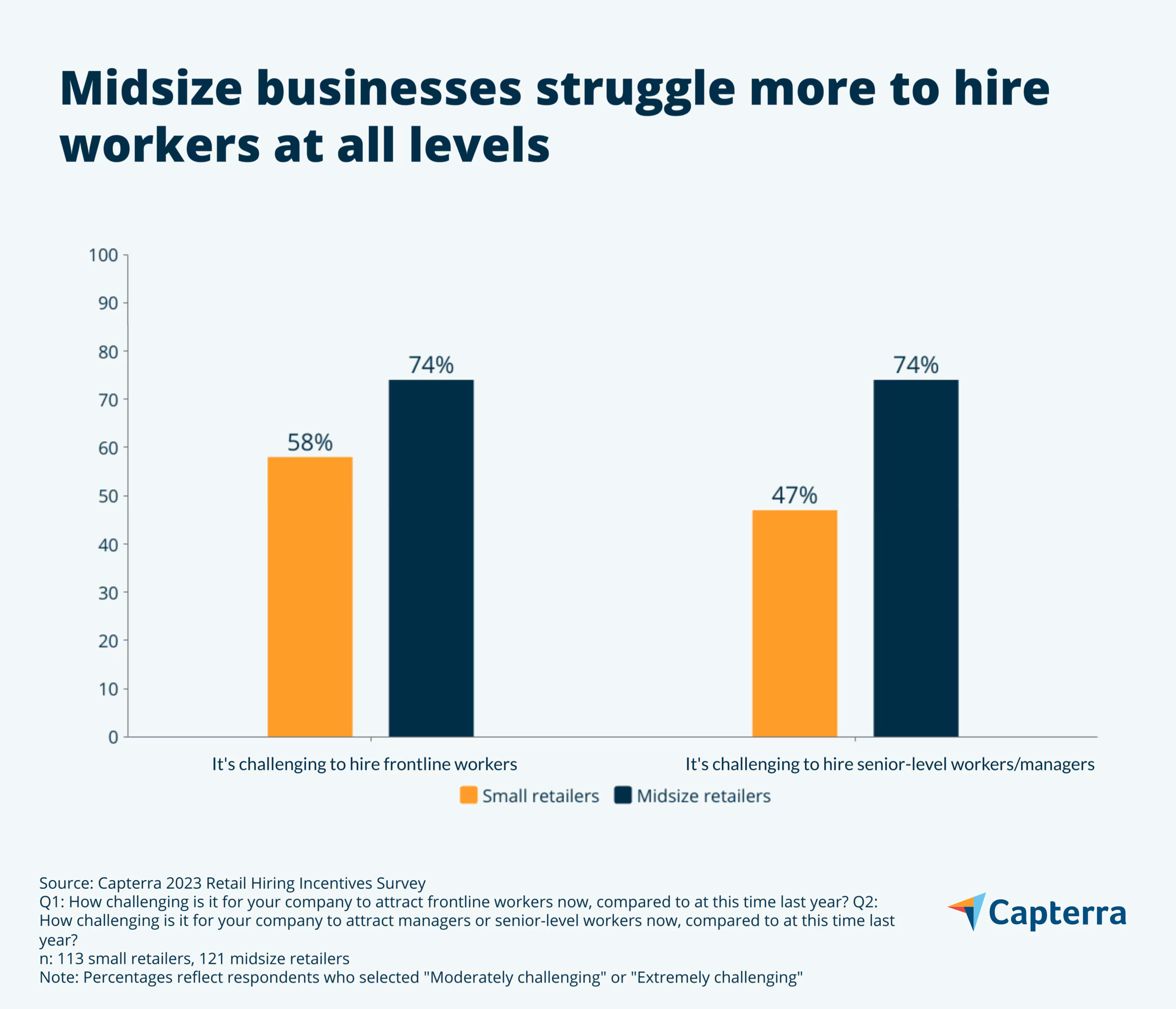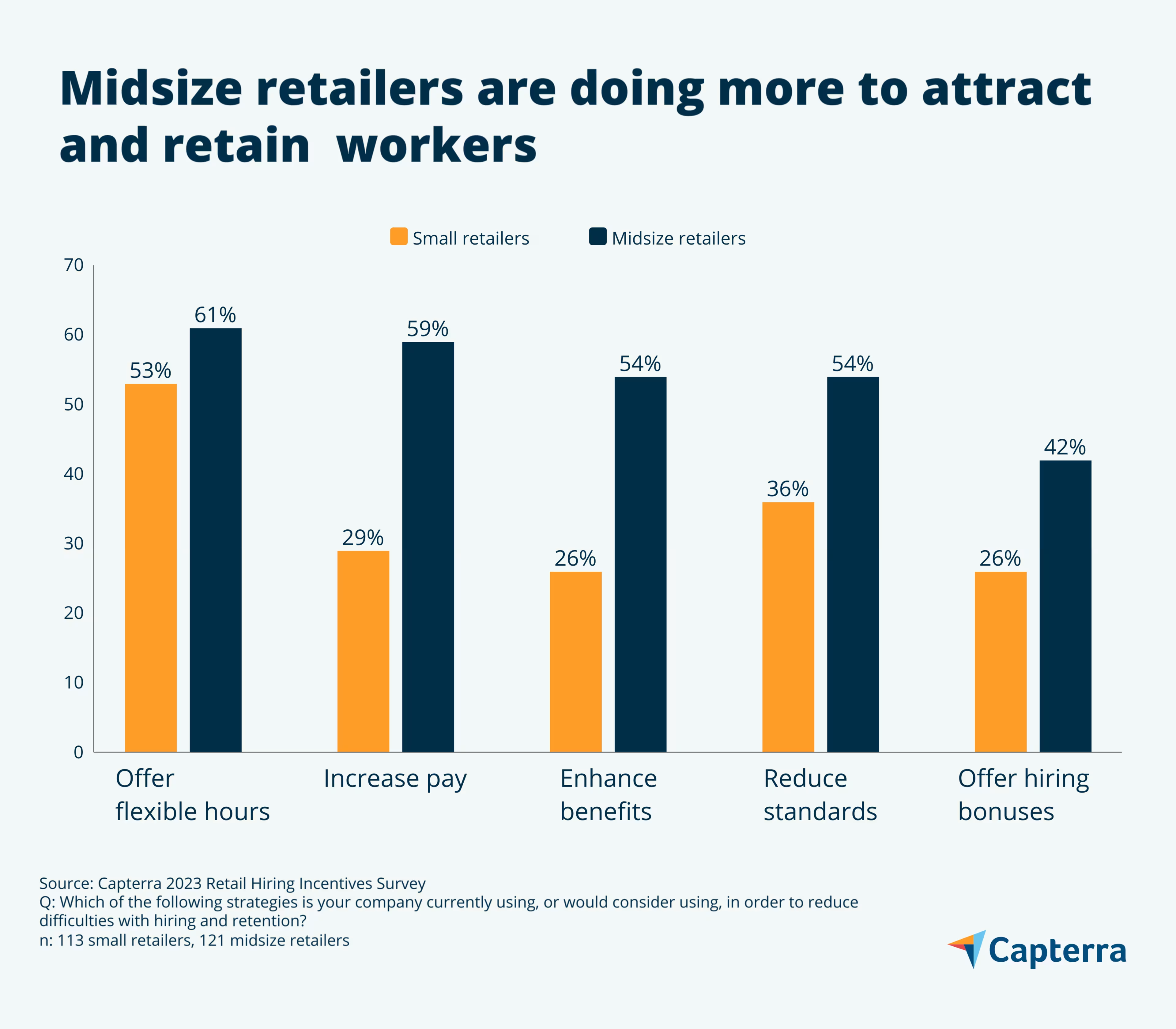Small businesses are struggling to compete against rising corporate pay.
Recent wage increases by retail giants such as Home Depot and Walmart have made hiring workers an even bigger headache for growing businesses. To get the full picture of today’s brutal retail labor market, we surveyed 300 retail business leaders. We found that 86% of SMB retailers—either small (with two to 100 employees) or midsize (101 to 1,000 employees)—believe attracting frontline workers is more challenging now than this time last year; 85% say hiring managers is tougher now, too.
Midsize retailers are being hit especially hard by current hiring difficulties—as a group, they're having a harder time hiring and contending with their competitors’ wages, compared to small retailers.
We’ll explore what’s making hiring so difficult as well as the techniques that SMBs are using to mitigate hiring struggles, so you can make competitive offers to the right candidates for your business.
/ Key findings
86% of SMB retailers say hiring frontline workers has become more challenging in the past year.
82% of SMB retailers say their competitors’ pay and benefits offerings make it difficult to compete for workers.
Finding skilled candidates is the top challenge for SMB hiring managers right now.
45% of SMB retailers are currently accepting candidates with less skill, experience, or education than desired in order to mitigate hiring challenges.
Competition for frontline workers is fierce, especially for midsize retailers
It’s a difficult time to be a hiring manager, especially at a small to midsize retail business. SMBs, which employ only up to 1,000 people, typically have much smaller margins than big-box companies. It’s harder for mom-and-pop retailers to compete for workers against Fortune-500 counterparts that advertise attractive pay and benefits, let alone weather the costs of attrition in the first place.

To be sure, the majority of larger surveyed retailers (those with 1,001 to 10,000 employees) also say it’s become more difficult to hire workers since last year. But with annual revenues averaging over $100 million, these companies are better positioned to absorb increased hiring costs.
Midsize retailers face many of the same disadvantages that small retailers do, like having smaller budgets than their corporate competitors. Even so, they experience greater hiring challenges, especially when hiring managers and senior-level employees.

There are a few possible factors to account for this difference:
Location: 60% of the small businesses we surveyed are located in rural or suburban areas, whereas 74% of midsize businesses are urban. Small retailers may face less competition for workers in their less-dense locales than the more urban midsize group.
Competitors: Small retailers tend to view other SMBs as their primary competition for workers. Midsize retailers view big-box retailers and gig-economy platforms as their primary competition. As a result, midsizers likely face greater pressure to step up their benefits and pay to attract applicants who are also considering well-funded corporate employers.
Hiring standards: Midsize retailers are generally more discerning in who they hire than are small retailers, especially when it comes to educational credentials and background checks. Our research shows that small retailers are more willing to hire applicants without college degrees and with criminal records.
/ The bottom line
Midsize retailers face stiffer competition through a concentration of wealthier employers in their area. The upward pressure this places on wages and benefits is difficult for these businesses to deal with.
Finding qualified candidates is a top challenge for SMB hiring managers
Today, finding applicants with the right mix of skills and experience is the biggest hiring challenge for SMBs, whether they’re looking for frontline workers or senior-level workers and managers. Keeping up with shifting post-pandemic standards for pay and benefits is also proving difficult.
Finding candidates with the right skills, experience, and education
The number-one challenge for SMB retail hiring managers, identified by 78% of our respondents, is finding workers with the right skills for the job. Similarly, 76% are having trouble finding candidates with relevant experience, and 70% can’t find candidates with sufficient education.
Finding candidates that want to work enough hours
The pandemic changed people's access to and attitudes toward jobs, and Americans are now working fewer hours than they were pre-COVID[1]. Accordingly, retailers are sometimes left with more hours than they can fill with new hires. Seventy-five percent of SMB retailers say it’s currently challenging to find candidates who want to work enough hours.
Offering competitive pay and benefits
It’s hard for SMB retailers to compete with the compensation packages offered by corporate competitors, especially when hiring managers or senior-level workers. With big names such as Home Depot and Walmart raising base pay for frontline workers in early 2023 (with more big-box retailers likely to follow suit), SMBs must do the same or lose out on talented new hires[2].
Covering training time and/or costs
It’s a vicious cycle: Spending extended periods of time searching for the right candidates can lead to lost productivity and revenue. That could prompt a struggling smaller retailer to lower their hiring standards. In turn, they may settle for candidates that need more on-the-job training before they can work independently—resulting in more expenses. The cost of training less-qualified new hires is a problem that 70% of SMBs are currently grappling with.
SMBs are sweetening offers and leveraging tech to attract job seekers
SMBs—midsize retailers in particular—are pulling out all the stops to mitigate hiring struggles by making their jobs more attractive. For example, most SMBs are offering flexible working hours to new hires, and well over half of midsize retailers are enhancing pay and benefits—42% are even dishing out hiring bonuses.

SMBs are also setting themselves up for success by keeping their hiring and payroll software portfolios updated. Most have upgraded their payroll and hiring software since the pandemic, and 37% have upgraded or purchased new software specifically to address recent hiring challenges.
Additionally, many SMBs have adopted new technologies to improve the employee experience, like instant pay, online shift scheduling, and learning management software.
Having the right software can help SMBs find great candidates and make good on promises to provide new hires with easy shift scheduling, transparent pay, and professional development opportunities.
SMB retailers can be successful with unique offerings and helpful technology
SMB retailers, keep in mind that you’re uniquely positioned to offer job seekers what corporations often can’t: the feeling of being on a small, tight-knit team. Some people just prefer to work for smaller businesses, where it’s easier to access leadership and feel like part of a community. As a small-business employer, you should embrace the opportunity to cultivate a culture of accountability, with transparency around pay and access to hands-on professional development and mentoring.
Hiring is difficult right now, but that doesn’t mean your team has to suffer. By enhancing pay and benefits where you can, offering more on-the-job training to eager but less-skilled candidates, and playing up the value of working for a small team, you can compete with bigger companies for top talent.
81% of SMB retailers are currently upgrading their software—or plan to do so—in order to mitigate hiring challenges.
If you lead a small retail business that’s struggling to hire, Capterra can point you to a variety of helpful technology and services.
Not sure where to look for new hires? Recruiting software and recruitment marketing platforms can help you find great candidates.
Thinking about hiring a payroll service provider to help you make attractive offers to new hires? Browse our list of top payroll service providers and learn more about their features in our hiring guide.
